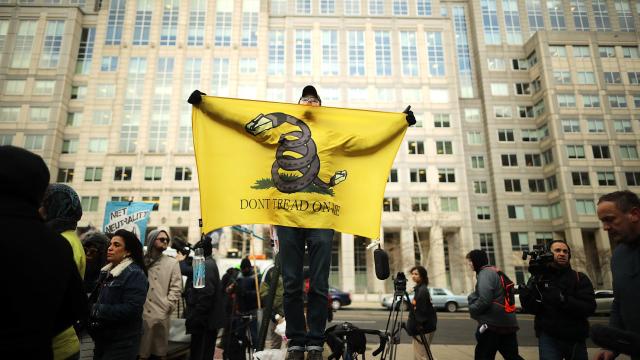US Democrats officially filed a petition yesterday to force a vote in the Senate to save net neutrality. With a single Republican supporting the effort, only one vote is needed to advance a resolution that may one day soon reinstate the net neutrality rules overturned by the FCC last year.
Demonstrators rally outside the Federal Communication Commission building to protest against the end of net neutrality rules 14 December 2017 in Washington, DC. Photo: Getty
“The American people know that the internet is for everyone and was invented with the guiding principle of nondiscrimination,” Sen Edward Markey, who led the effort, said at a press conference yesterday.
Sources with knowledge of the resolution’s progress in the Senate say a vote is likely to take place next week, though negotiations with leadership are ongoing. The resolution was officially discharged from committee after Markey’s petition gathered 49 signatures, only 30 of which were needed. Only a simple majority is required to pass the resolution – 51 senators, assuming all are present.
Sen Susan Collins, Republican of Maine, has already agreed to support it.
The Republican-led Federal Communications Commission voted in mid-December to overturn the FCC’s 2015 Open Internet Order, which established rules preventing internet service providers from blocking or throttling legal content or creating so-called “fast lanes” for content providers that paid more to have their sites or services delivered to customers at greater speeds.
The move was championed by FCC Chairman Ajit Pai, who claimed revoking the net neutrality rules was somehow both necessary and would have little or no impact on internet users and online businesses.
With one vote still needed for passage, net neutrality advocates are pressing hard on a number of prominent Republicans, including, among others, Sen Robert Portman of Ohio, Sen Orrin Hatch of Utah, and Sen Lisa Murkowski of Alaska. Several of the internet’s most popular web companies initiated a collective action yesterday, putting the internet on “Red Alert” ahead of the crucial vote – among them, Reddit, Tumblr, Tinder, Foursquare, Pornhub and Etsy.
Foursquare CEO Jeff Glueck said his company had donated the use of its advertising platform, Pinpoint, to the cause. “We will deliver a national campaign urging Americans in five critical states to call their senators and fight for their right to a free and open Internet,” he said.
Fight for the Future’s Evan Greer, a chief organiser of the Red Alert campaign, said the Senate vote would impact US consumers for years to come, calling the effort “the most important moment in tech policy since the FCC repeal”.
Lawmakers, primarily Democrats, are attempting to overturn the FCC order that dismantled net neutrality through use of the Congressional Review Act (CRA), which enables Congress to review and eliminate new federal regulations issued by government agencies. Should the resolution to overturn the FCC order pass in the Senate, it will proceed to the House, overriding a similar effort there that is already underway.
“Congress needs to pass this resolution to restore real net neutrality and defend the free and open internet,” Sen Ron Wyden told Gizmodo.
“Republicans and Ajit Pai argue that if we repeal net neutrality then Big Cable companies will have more money and that will somehow trickle down to consumers. I’m not willing to bet on the charitable nature of cable companies, and neither are the Oregonians I heard from at town halls last week.”
The House, however, presents its own set of unique challenges for the Democrats. Namely, the resolution cannot be discharged from committee by only a minority of lawmakers, as happened in the Senate yesterday. House rules will require a simple majority, or 218 members, to sign on before a vote will take place. While Republicans hold a majority in the House, all 435 lawmakers are up for re-election in November, bipartisan support for net neutrality among voters could influence how the chamber moves on the issue.
Unlike the Senate, where a time limit was placed on the use of the CRA, the House will have until the end of the 115th Congress, on 3 January 2019, to vote. If the resolution is passed there, it will go to the president for a signature or veto. President Donald Trump, who has scarcely remarked on net neutrality in the past, remains a wildcard in this area. Net neutrality is incredibly popular, even among Republicans. And Trump may ultimately decide to do what is popular.
“As an advocate, it’s frustrating because it is such a good campaign issue and it’s so partisan on the Hill,” said Allie Bohm, policy council at Public Knowledge. “And it’s completely non-partisan once you leave the Capitol complex.”
Last month, a University of Maryland study, which featured detailed questions about net neutrality, showed that 86 per cent of the country opposed the FCC’s decision to roll back the protections. That number includes 82 per cent of Republicans – a significant uptick from December, when only 75 per cent of Republicans opposed the FCC order.
“We need Republicans to vote for this,” added Bohm. “It’s good politics for them to do it. They should do it. But as they see it as a Democratic campaign issue, it does make it harder for them to come along.”
Sen Brian Schatz, who has characterised yesterday’s event as the beginning of a “political movement” to re-establish net neutrality, said Republicans have awoken “a sleeping giant” that come to haunt them in the midterms, if it’s not discharged before then.
“Just to give you a sense of how this thing checks politically, Burger King does not weigh in on political or legislative matters,” Schatz said, pointing to a video (above) that the fast food company produced mocking the FCC’s decision earlier this year. Burger King saw “zero risk”, he said, in taking sides, demonstrating how decisively the issue polls.
